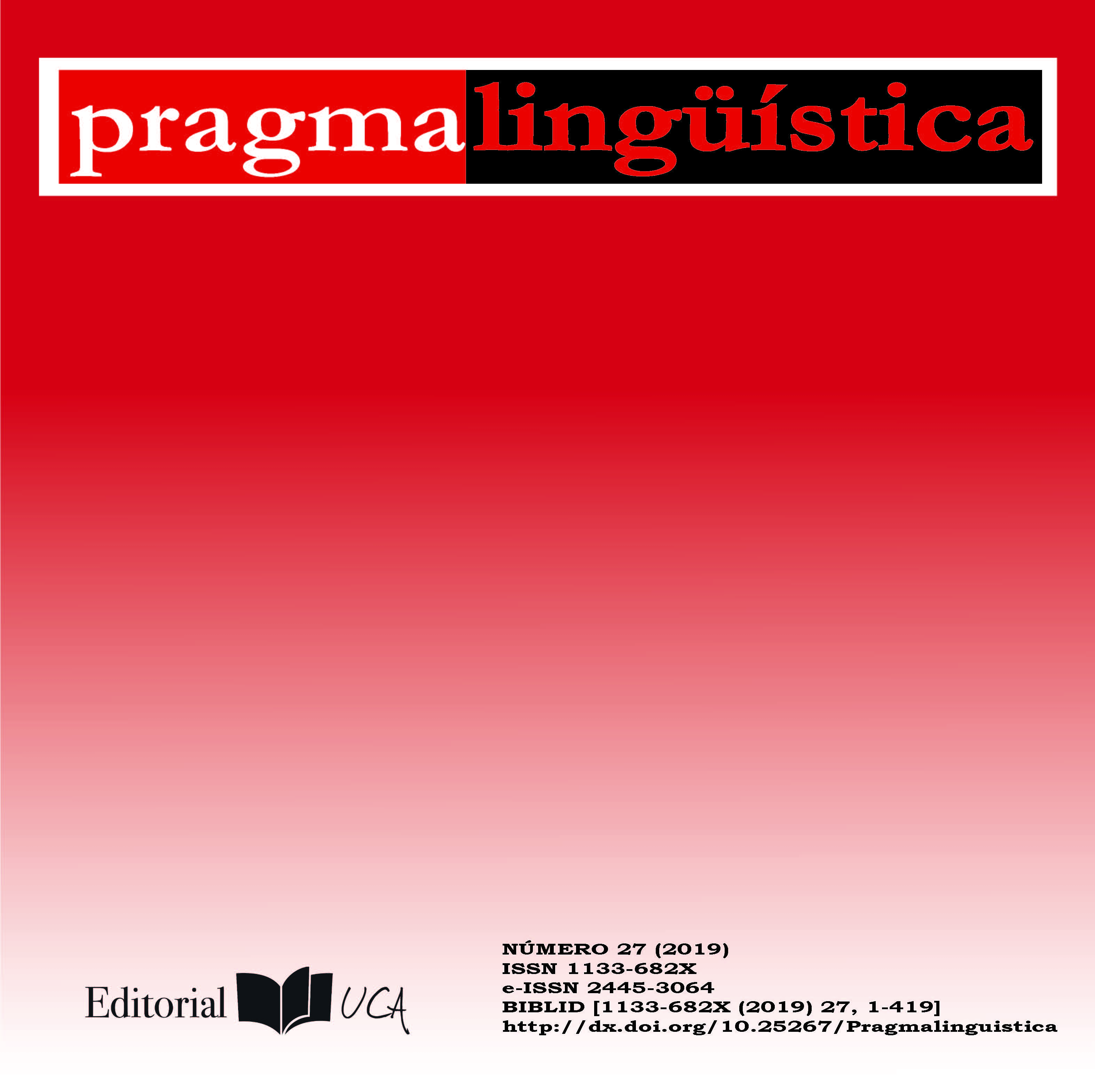Impoliteness in Facebook comments related to election news of CRHoy.com and La Nación in Costa Rica’s election process of 2018

DOI
https://doi.org/10.25267/Pragmalinguistica.2019.i27.12Info
Abstract
Social media has become a space where the communicative practices involved in face to face communication have been transferred. This is the reason why a new area of pragmatics has been proposed, which is called cyberpragmatics, that pretends to study the language in its cybernetic context. From this proposal, the objective of this investigation is to analyze the impoliteness in the comments on Facebook related to election news of CRHoy.com and La Nación during Costa Rica’s election process of 2018. In order to obtain the results, the classification proposed by Halim (2015) was used. From the analysis, it was revealed that condescension, criticism or complaint, and insults were the most used strategies by the users. Finally, the conclusion is that the users of this social network take advantage of the communicative situation to generate a great amount of impolite comments and attack the other.
Keywords
Downloads
How to Cite
License

This work is licensed under a Creative Commons Attribution-NonCommercial-NoDerivatives 4.0 International License.
References
BLAS ARROYO, J. L. (2010): “Niveles en la caracterización de las estrategias discursivas. Aplicaciones al estudio de la descortesía en un corpus mediático”, Español Actual, 94, 47-76.
CABEZAS, Y. (3 de enero de 2018): “Fabricio Alvarado protesta en las afueras de Canal 7”, CRHoy.com. Publicación electrónica: https://www.facebook.com/crhoy.comnoticias/posts/1947740865268271.
CHIERICHETTI, L. (2016): “Oralidad digital, identidad verbal y descortesía en las páginas de Facebook de festivales de música”, Orillas, 5, 1-16.
CHINCHILLA, S. (31 de marzo de 2018): “Artistas y escritores: 'No podemos echar por la borda nuestro esfuerzo de libertad de creación'”, La Nación. Publicación electrónica: https://www.facebook.com/lanacioncr/posts/10160313918810051.
CULPEPER, J. (2005): “Impoliteness and entertainment in the television quiz show: The Weaker Link”, Journal of Politeness Research, 1, 35-72.
CULPEPER, J. (2011): “Politeness and impoliteness”, Aijmer, K. y Andersen, G. (eds.): Sociopragmatics (Handbooks of Pragmatics), Berlín: Mouton de Gruyter, pp. 391-436.
CULPEPER, J. (2016): “Impoliteness Strategies”, Capone, A. y Mey, J. (eds.): Interdisciplinary Studies in Pragmatics, Suiza: Springer International Publishing, pp. 421-445.
DALTON, E. (2013): “Impoliteness in Computer Mediated Communication”. Publicación electrónica: http://sdsu-dspace.calstate.edu/bitstream/handle/10211.10/4255/Dalton_Eric.pdf?sequence=1
DECEMBER, J. (1997): “Notes on Defining of Computer-Mediated Communication”. Publicación electrónica: http://www.december.com/cmc/mag/1997/jan/december.html.
GALLARDO, B. y ENGUIX, S. (2016): Pseudopolítica: el discurso político en las redes sociales, Valencia: Universidad de Valencia.
GIL, J. M. (2006): “Amenaza e invasión de la imagen. Un estudio sobre la naturaleza de la cortesía verbal”, Pragmalingüística, 14, 75-86.
GOFFMAN, E. (1967): Interaction ritual: Essays on the face-to-face behaviour, Nueva York: Anchor Books.
HALIM, S. A. (2015): “Impoliteness Strategies Used in a Politician’s Facebook”. Publicación electrónica: https://books.google.co.cr/books/about/Impoliteness_Strategies_Used_in_a_Politi.html?id=fDSpAQAACAAJ&redir_esc=y.
HAVERKATE, H. (1994): La cortesía verbal, Madrid: Editorial Gredos, S. A.
KAUL DE MARLANGEON, S. y CORDISCO, A. (2014): “La descortesía verbal en el contexto político-ideológico de las redes sociales”, Revista de Filología, 32, 145-162.
LIU, X. (2017): “Impoliteness in Reader Comments on Japanese Online News Sites”, International Journal of Languages, Literature and Linguistic, 3(2), 62-68.
MARTIN, J. y WHITE, P. (2005). The language of evaluation: Appraisal in English, Londres: Palgrave Macmillan.
MENA, A. (2016): “TIC y Medios de Comunicación en PROSIC”, Hacia la sociedad de la información y el conocimiento. Publicación electrónica: http://www.kerwa.ucr.ac.cr/bitstream/handle/10669/30116/cap8_2016.pdf?sequence=1&isAllowed=y.
MURILLO, J. (2002): “La cortesía verbal en el español de Costa Rica”, Káñina, 26(2), 109-118.
OVIEDO, E. y MADRIGAL, R. (25 de marzo de 2018): “Fabricio Alvarado se reunió con pastores para coordinar su ayuda de cara a la segunda ronda”, La Nación. Publicación electrónica: https://www.facebook.com/lanacioncr/posts/10160284729775051.
PORTOLÉS, J. (2004): Pragmática para hispanistas, Madrid: Síntesis.
SHAO, G. (2009): “Understanding the appeal of user-generated media: A uses and gratification perspective”, Internet Research, 19(1), 7-25.
SOLANO, H. (17 de enero de 2018): “Alvarado niega responsabilidad por aumento de convención de Recope”, CRHoy.com. Publicación electrónica: https://www.facebook.com/crhoy.comnoticias/posts/1953247048050986.
SPENCER-OATEY, H. (2005): “(Im)politeness, face and perceptions of rapport: Unpacking their bases and interrelationships”, Journal of Politeness Research: Language, Behavior and Culture, 1(1), 95-120.
VIVAS MÁRQUEZ, J. (2014): “La cortesía valorizadora en las redes sociales. Análisis de un corpus de publicaciones en Facebook”, Pragmalingüística, 22, 154-172.
VIVAS MÁRQUEZ, J. y RIDAO RODRIGO, S. (2015): “Estrategias de (des)cortesía en redes sociales: análisis comparativo de Facebook y Twitter”, Sintagma, 27, 73-87.
WIBOWO, G. P. y KUNTJARA, E. (2012): “Impoliteness Strategies Used on Online Comments in an Indonesian Football Website”, Student Journals - Petra Christian University, 1(1), 166-173.
YUS, F. (2010): Ciberpragmática 2.0, Barcelona: Planeta.






